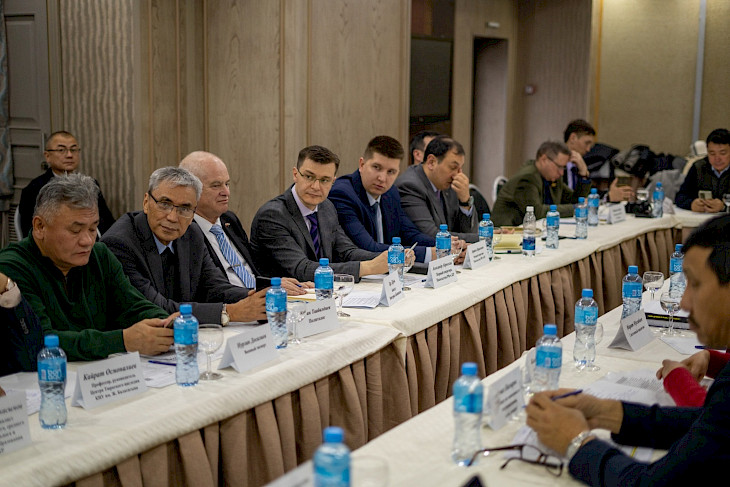In early November, the capital of Kyrgyzstan hosted the 11th Summit of the Organization of Turkic States (OTS), culminating in the Bishkek Declaration, which was endorsed by all OTS heads of state. The Center for Expert Initiatives "Oy Ordo" has published opinions from various experts who participated in a roundtable discussing the outcomes and significance of the OTS summit.
According to some experts, while the summit was impeccably organized and conducted, enhancing Bishkek's image, it did not achieve groundbreaking substantive results. This sentiment was voiced during the roundtable titled “Outcomes of the OTS Summit: Geopolitical Contours of the Turkic World – Ideology, Economy, Security.”
System analyst Baktybek Saipbayev noted that the Organization of Turkic States is currently “stagnating,” as evidenced by Turkmenistan’s reluctance to become a full member. To address such challenges, Saipbayev suggested Kyrgyzstan propose renaming the organization to the “Organization of Turkic States and Peoples.”
“In Russia, for example, there are Tatars, Bashkirs, and Chuvash in the Volga region; Kumyks, Nogais, Karachays, and Balkars in the Caucasus; and Altaians, Shors, Khakassians, and Tuvans in Southern Siberia and the Altai. There are also Uighurs in China and Gagauz in Moldova. If we changed the name, we could include these peoples in the OTS,” Saipbayev explained.
Regarding prospects for military-political cooperation and creating a defensive alliance, the expert argued such discussions raise numerous questions and misunderstandings.
“It’s one thing to discuss security, intelligence cooperation, and combating international terrorism. It’s quite another to create a military-political or defensive alliance. Against whom? How can there be a defensive alliance when Turkey - a NATO member - is part of it? From examples like Georgia and Ukraine, we know how it begins - with offers of cooperation - and then comes talk of joining an alliance,” the expert noted.
He emphasized that OTS should focus on economic, scientific, educational, and cultural cooperation.
“Developing these areas will not provoke resistance from neighbors like Russia and China. Moreover, we should integrate these countries into our processes. If they became part of the Organization of Turkic States and Peoples, it would give the organization a new lease on life. It would gain real strength instead of remaining at the level of lofty conversations,” Saipbayev added.
Political scientist Kuban Taabaldiev observed that OTS is a unique organization attempting to encompass diverse areas of cooperation—cultural-humanitarian, ideological, economic, and military-political. However, it is being formed based on ethnic and religious criteria, uniting very different states, which naturally leads to certain disagreements.
“As an academic, I’d like to draw attention to humanitarian issues. Before Turkish President Recep Tayyip Erdoğan’s visit to Kyrgyzstan, faculty members at the Manas University wrote a letter to the president of Kyrgyzstan, the prosecutor general, and the chairperson of the Supreme Court. They raised concerns about the university's operations, questioning which laws it follows - those of Turkey or Kyrgyzstan - and under what legislation staff are hired or retired. The letter reached our president, but the response was essentially, ‘Let’s just keep working.’ This was said before Erdoğan’s visit to Bishkek, likely because other, more strategic issues were on the agenda,” Taabaldiev remarked.
He criticized the sidelining of significant humanitarian issues that directly impact the people.
“Why are we ignoring what’s happening at Manas University and other educational institutions in the country under Turkish influence? The more we concede, the more pressure we face. In the early years of independence, Turkey treated us well. However, significant changes in Kyrgyz-Turkish relations began with the presidencies of Ahmet Necdet Sezer and later Erdoğan, driven by Turkey’s domestic politics. We must study the history of our relations with Turkey, understanding their historical and educational contexts, to avoid future mistakes. Turkey's educational policies and overall influence in Kyrgyzstan could lead to its dominance,” the political scientist warned.
He cautioned that failing to address these factors could turn OTS into a tool of pressure.
“I’m not saying we shouldn’t be part of OTS, but our flag, independence, and humanitarian positions must be protected,” Taabaldiev stressed.
Meanwhile, political scientist Baktybek Jumagulov linked the emergence of international organizations like OTS to a crisis in international law.
“The creation of the Organization of Turkic States or BRICS responds to the crisis in traditional international structures like the UN and its Security Council, which can no longer ensure security. This was evident in Yugoslavia, Iraq, Libya, Syria, and ongoing conflicts. New blocs are forming as responses to global or regional crises,” Jumagulov explained.
However, he argued that OTS should not be positioned against organizations like the SCO, CIS, CSTO, or the Eurasian Economic Union.
“Instead, we should seek points of convergence. For instance, OTS projects can be integrated with the Belt and Road Initiative. Rather than competing, these organizations can coexist and complement one another. Humanitarian and cultural aspects should also receive attention. Language and religion are foundational elements of OTS cooperation, but these topics should be discussed through the lenses of history, anthropology, geography, cultural studies, and sociology—not solely as political decisions,” Jumagulov added.
The event was organized by the Center for Expert Initiatives “Oy Ordo.”
CentralasianLIGHT.org,
November 21, 2024

